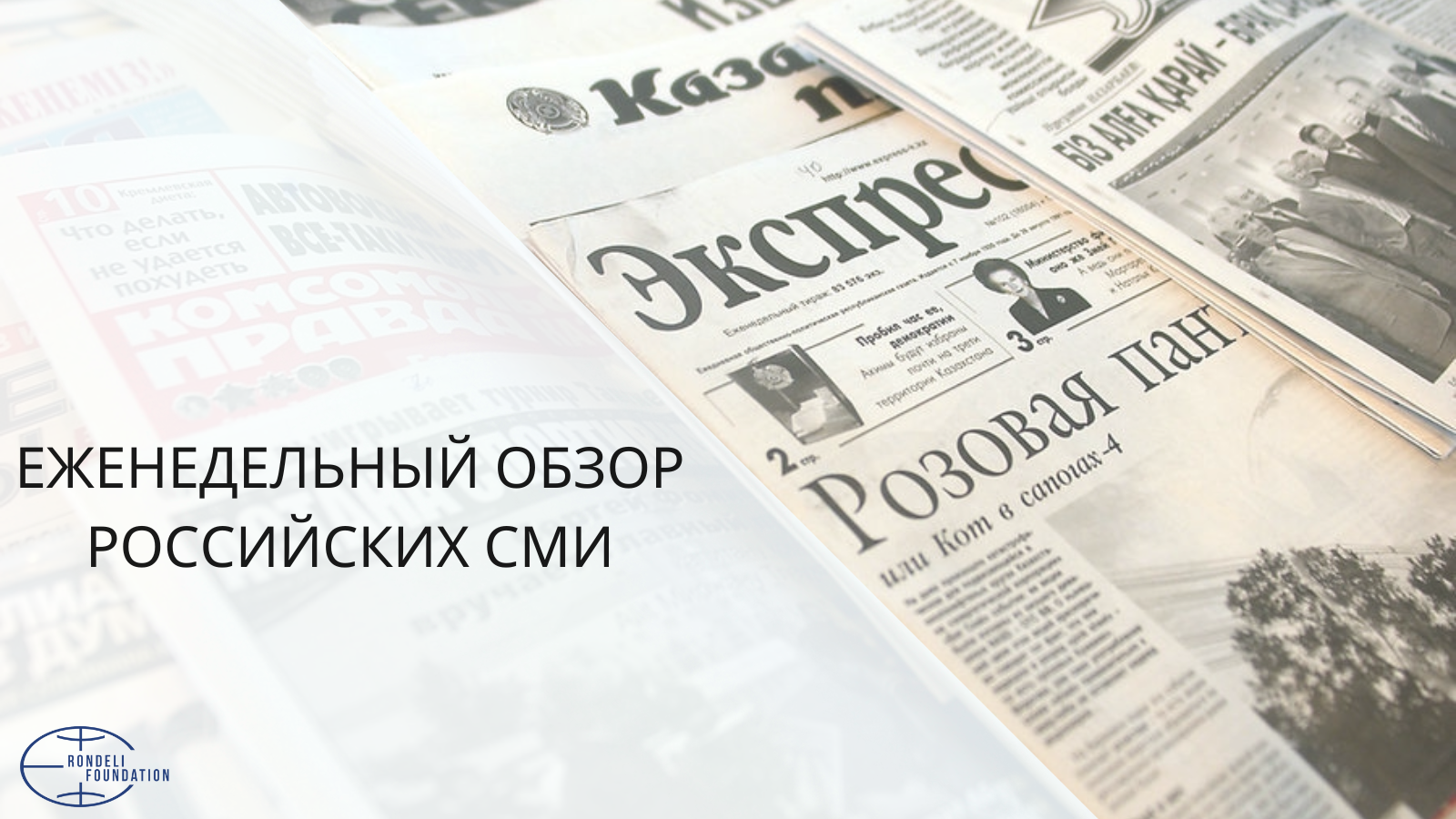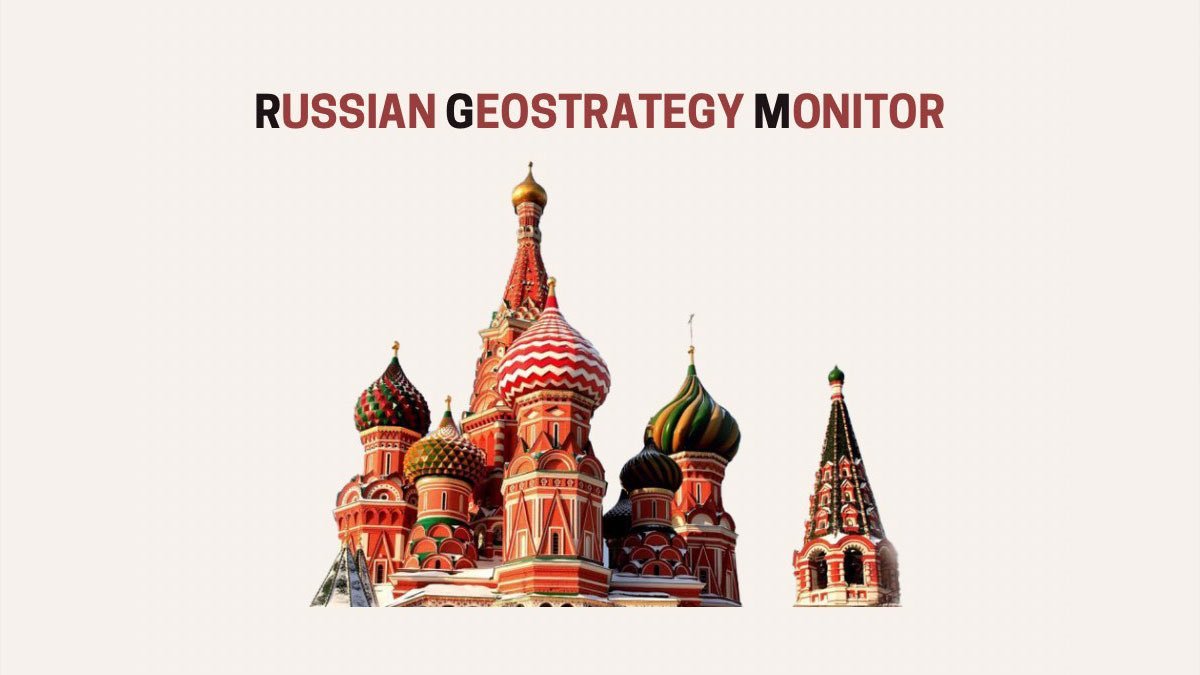Author: David Batashvili, Research Fellow at the Rondeli Foundation
The Rondeli Foundation’s Russian Geostrategy Monitor is a monthly brief that tracks Russian geostrategy worldwide employing the framework set in The Structure of Modern Russia’s Foreign Strategy. Russian geostrategic activities are also tracked on the regularly updated interactive Russian Geostrategy Map.
Issue 7 covers Russian geostrategy for the month of July 2023. The numbering and contents of the Outcomes, Goals and Objectives follows The Structure of Modern Russia’s Foreign Strategy framework.
Outcome 1: Replacement of the United States’ international preeminence with a ‘multipolar’ or ‘polycentric’ system, with Russia in the position of one of the principal ‘poles’
- On 28 July, during the Russia-Africa summit, Putin said in his speech that “a truly multipolar world order is being formed, and the era of hegemony of one state or a group of them is receding into the past, however not without resistance from those who have grown used to their own exceptionalism and monopoly in world affairs.”
- Russian foreign minister Lavrov said in an interview published on 13 July: “The strengthening of multipolar world is reality, not someone’s whim. The renewed [Russian] Foreign Policy Concept proclaims the civilizational mission of Russia as a world power playing a balancing role in the international affairs.” In a speech on 12 July, Lavrov welcomed the end of the “collective West’s domination” and “the formation of a fairer, more balanced polycentric world order.”
Objective 5: Thwarting US Policies in Syria
- On 6 July, the US Air Force released a video of Russian warplanes “harassing” American drones in the Syrian sky.
- On 25 July, the US military stated that a Russian fighter jet had hit a US drone with a flare over Syria, seriously damaging it.
Objective 7: Achieving instability in the Western Balkans
- On 20 July, the Russian foreign ministry speaker Zakharova said during a briefing: “Kosovan leadership is fanatically seeking to turn this part of Serbia into an ethnically clean Albanian territory. It is not even thinking about co-existence with the Serbs.” This continued a series of the Russian foreign ministry statements accusing Kosovo of currently attempting an ethnic cleansing of the Serbs. On 7 July, Zakharova said there was “an immediate threat to the existence of the Serbian people in Kosovo,” accusing the Kosovan authorities of anti-Serb “ethnic cleansing”.
Objective 9: Achieving de-sovereignization of Ukraine
- In the Russo-Ukrainian War, the Ukrainians continued to push forward in the south, while Russians launched attacks in the northern part of the frontline. The Ukrainians also stabilized their control over a bridgehead across the Dnipro River in Kherson Oblast.
- It was revealed in July that in June 2023 a Russia-affiliated former Ukrainian politician Victor Medvedchuk, who is based in Russia, had established in Moscow a political organization called the ‘Different Ukraine”.
Objective 11: Achieving decisive influence over Moldova
- The head of Moldova’s security service (SIB) stated on 10 July that Moldovan authorities had uncovered and dismantled a Russian spy network coordinated by the FSB and designed to strengthen the Russian influence in Moldova.
Objective 15: Entrenching Russian influence in the Western Balkans
- On 11 July, the US sanctioned Aleksandar Vulin, a pro-Russian head of the Serbian Security and Information Agency (BIA) for promoting Russian influence and supporting Russian activities in Serbia and the Western Balkans.
Objective 16: Entrenching Russian influence in sub-Saharan Africa
- On 26 July, a military coup overthrew the democratically elected president of Niger Mohamed Bazoum. In the following days, groups of people in the streets seeking to demonstrate the supposed popular support for the coup systematically carried Russian flags and employed anti-French slogans.
- Russia’s satellite regimes in Mali and Burkina Faso jointly announced that if the regional organization ECOWAS intervened militarily against the coup in Niger, they would join the war on the side of the coup organizers in the latter country.
- On 29 July, the head of the Burkina Faso regime Traore told Putin that “Russia is now conducting a special military operation [in Ukraine] and I assure you that our people supports you and your government.”
- On 4 July, the Russian ambassador in Mali met with representatives of the Tuareg ex-rebel armed groups, reassuring them that their peace agreement with Mali’s government would hold after the coming withdrawal of the UN’s Minusma peacekeeping force from Mali.
- In June-July 2023, Russia sold 50,000 tonnes of grain to Mali “for well below market prices.”
- The Wagner Group stated on 16 July it was sending more of its fighters to the CAR in order to provide security for the coming referendum in which the head of the CAR regime, Touadéra, was to seek extension of his presidential term.
- Zimbabwe authorities stated that Putin had gifted the president of Zimbabwe Emmerson Mnangagwa a presidential helicopter. In his turn, Mnangagwa declared his support for the Russian war of aggression against Ukraine.
- On 26 July, Russia granted a debt relief of $684 million to Somalia.
Objective 20: Alignment with China
- Starting from 20 July, Russia and China conducted joint naval exercises in the Sea of Japan.
Objective 26: Developing cooperation platforms with non-Western powers
- Speaking on 4 July at the online meeting of the Shanghai Cooperation Organization heads of states, Putin welcomed Iran’s joining the SCO, and wished for Belarus to also join the Organization as soon as possible.
- On 24 July, Secretary of the Russian Security Council Patrushev met with the highest-level security officials from the BRICS member states and other partner countries including: China, Iran, India, Brazil, South Africa, Egypt, Saudi Arabia, the UAE, Kazakhstan, Belarus, and Burundi. According to Moscow, the meeting reaffirmed the agreement “to move in the direction of multipolar system” in the world. It was also stressed that BRICS was becoming more and more popular “for many states of the global South and East.”







